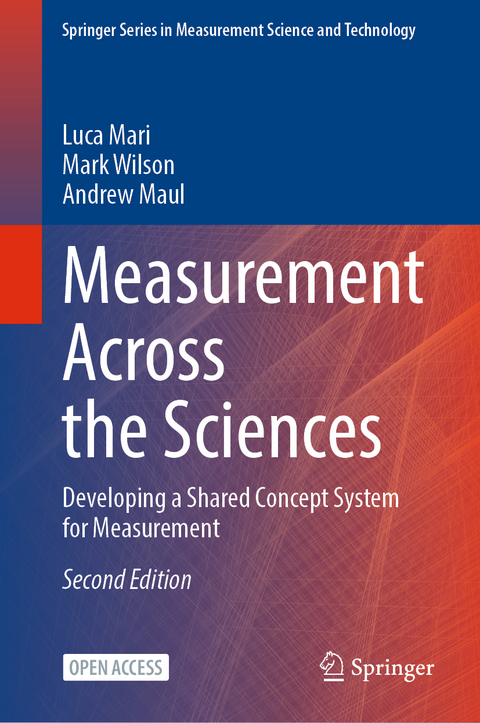
Measurement Across the Sciences
Springer International Publishing (Verlag)
978-3-031-22447-8 (ISBN)
This revised and expanded second edition features a new analysis of the analogies and the differences between the error/uncertainty-related approach adopted in physical measurement and the validity-related approach adopted in psychosocial measurement. In addition, it provides a better analysis and presentation of measurement scales, in particular about their relations with quantity units, and introduces the measurand identification/definition as a part of the "Hexagon Framework" along with new examples from the physical and psychosocial sciences. Researchers and academics across a wide range of disciplines including biological, physical, social, and behavioral scientists, as well as specialists in measurement and philosophy appreciate the work's fresh and provocative approach to the field at a time when sound measurements of complex scientific systems are increasingly essential to solving critical global problems.
Luca Mari is a Professor of Measurement Science at Università Carlo Cattaneo-LIUC, Castellanza, Italy, where he teaches courses on measurement science and statistical data analysis, and systems theory, and digital thinking. He is an International Electrotechnical Commission (IEC) Expert in the WG2 (VIM) of the Joint Committee for Guides in Metrology (JCGM), and he was Chair of the IEC TC 1 (Terminology) and Secretary of the IEC TC 25 (Quantities and Units), and Chair of TC 7 (Measurement Science) of the International Measurement Confederation (IMEKO). In Italy, he is Chair of the UNI-CEI TC 027 (Metrologia) and was Chair of the CEI TC 1/25 (Terminologia, grandezze e unità). His research activities focus on fundamental topics of measurement science and its relations to information science and technology, systems theory, information systems, and eLearning. He received the Ph.D. from the Polytechnic of Torino, Italy, in 1994. Mark Wilson is a Distinguished Professor of Education at the University of California, Berkeley, and also at the University of Melbourne. His interests focus on measurement and applied statistics, and he has published over 100 refereed articles in those areas and over 50 invited chapters. He was elected President of the Psychometric Society and also of the US National Council for Measurement in Education (NCME). He is a Member of the US National Academy of Education, a Fellow of the American Educational Research Association, and a National Associate of the US National Research Council. He is Director of the Berkeley Evaluation and Assessment Research (BEAR) Center. His research interests focus on the development and application of sound approaches for measurement in education and the human sciences, the development of statistical models suitable for measurement contexts, the creation of instruments to measure new constructs, and scholarship on the philosophy of measurement. He received his Ph.D. degree from the University of Chicago in 1984. Andrew Maul is a professor in the Department of Education at the University of California, Santa Barbara. His work integrates lines of inquiry traditionally associated with statistics, philosophy, psychology, and history, with the aim of improving the quality of methodological practices in the human sciences, and in particular the theory and practice of measurement. He received his Ph.D. in 2008 from the University of California, Berkeley. He regularly teaches courses on the construction and validation of measuring instruments, item response theory, and the philosophy of measurement, as well as introductory and advanced research methods and applied statistics.
Introduction.- Fundamental Concepts in Measurement.- Technical and Cultural Contexts for Measurement Systems.- Philosophical Perspectives on Measurement.- What is Measured?.- Values, Scales, and the Existence of Properties.- Modeling Measurement and Its Quality.- Conclusion.
| Erscheinungsdatum | 28.02.2023 |
|---|---|
| Reihe/Serie | Springer Series in Measurement Science and Technology |
| Zusatzinfo | XXXIX, 307 p. 73 illus., 68 illus. in color. |
| Verlagsort | Cham |
| Sprache | englisch |
| Maße | 155 x 235 mm |
| Gewicht | 642 g |
| Themenwelt | Mathematik / Informatik ► Informatik ► Theorie / Studium |
| Naturwissenschaften ► Physik / Astronomie ► Theoretische Physik | |
| Sozialwissenschaften ► Soziologie ► Empirische Sozialforschung | |
| Schlagworte | Data-driven Science, Modeling and Theory Building • open access • Performance Management • Performance Measurement • Philosophy of measurement • Physical and mental measurement • Physical and non-physical measurment • Physical and Social Measurement • Psychometrics |
| ISBN-10 | 3-031-22447-7 / 3031224477 |
| ISBN-13 | 978-3-031-22447-8 / 9783031224478 |
| Zustand | Neuware |
| Haben Sie eine Frage zum Produkt? |
aus dem Bereich


